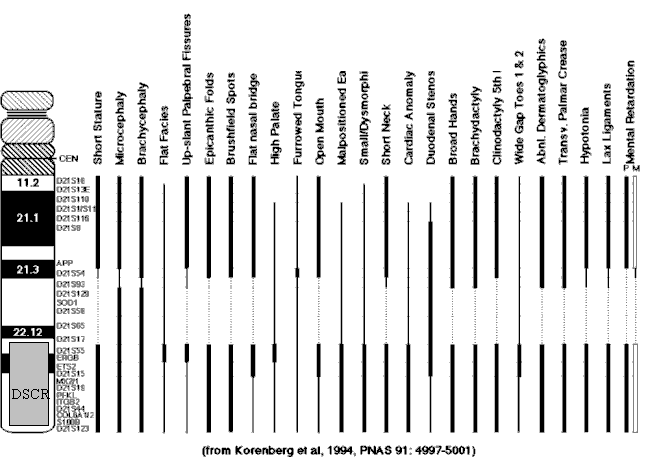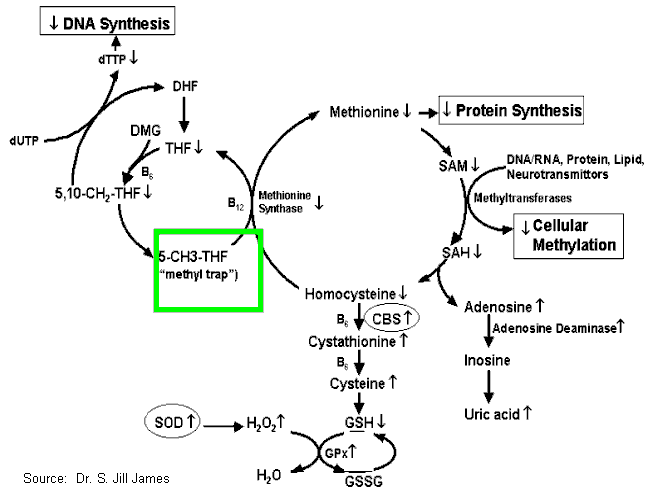David H. Swenson, Ph.D.
H. H. Dow Professor of Chemistry
Saginaw Valley State University
University Center, MI 48710
Trisomy 21 Research Conference
September 13-14, 2003. New Orleans, LA
|
 |
Permission granted by the author (revised 2006).
|
Our Research Questions Begin With a Survey of a Genetic Condition: Down Syndrome
- Gene overdose, but which?
- What are expected metabolic responses to gene dosage?
- What are predicted responses to gene dosage, and how can it be demonstrated?
- Is intervention possible?
DS Phenotypic Map

Three Gene Systems of Interest on 21
| Gene |
Reason for Interest |
| GART |
Purine Synthesis |
| SOD |
Superoxide Dismutase |
| CBS |
Folate and SAM Limitation MORE? |
Let's Talk About GART
- Gart is a gene system with 3 enzyme activities that make AMP (adenosine monophosphate) and GMP guanosine monophosphate).
- AMP and GMP are two components of the genetic code, and are used elsewhere.
- AMP and GMP are made in the body and excesses are broken down to uric acid (urate).
- Children with DS typically have high urate levels in the blood.
What's Wrong With Urate?
- Urate in the blood indicates that purines are being degraded.
- Each molecule of urate produced is accompanied by production of one or two molecules of superoxide.
- This superoxide may feed the SOD enzyme (also overexpressed).
Unresolved Questions About GART
- Early Steps in Purine Synthesis Have Negative Feedback Control. Therefore, How Can Gene Overexpression Lead to Excess Purines?
- What is the True Source of Purines From Which Urate is Made?
- Is Urate Production Really a Significant Source of Superoxide?
- Should We Consider Inhibition of the Early Step Purine Genes?
Let's Talk About SOD
- First step in conversion of metabolically generated superoxide to water.
-
| Normal Oxygen Metabolism in Mitochondrion |
 |
Superoxide |
| Uric Acid Production |
- Superoxide Dismutase is 50% Overexpressed in DS
- GS Px and Catalase Are Not Overexpressed, So Peroxide May Build Up
| O2·- |
→ |
H2O2 |
→ |
H2O |
| Superoxide |
Hydrogen
Peroxide |
Water |
What's So Bad About Hydrogen Peroxide?
- Good Antibacterial Agent
- From a bottle at 3% or
- Produced by white blood cells via SO/SOD
- Breaks Down, Especially in Presence of Iron, to Hydroxyl Radical: HO·
- Attacks Cell Membranes
- Attacks DNA
- Initiates Lipid Peroxidation
- Alzheimer's Disease Link?
- Aging Link?
- Retardation Link?
-
Let's Talk About CBS (Cystathionine Beta Synthase)
- Critical enzyme in synthesis of cysteine at expense of methionine
- Overexpressed 50% in DS
- In DS Critical Region
- Current research has focused on disruption of folate metabolism
- Overexpression may overproduce cysteine and collapse SAM cycle
Key Folate/SAM Issues in DS

The overexpression of CBS resulting in the trapping of folate and loss of adenosine from the SAM cycle as the cause of oxidative damage in Down Syndrome seems dubious.
SAM cycle is mighty but small. Is there enough adenosine is in the cycle to account for the high levels of uric acid found in the blood, without total obliteration of the cycle?
If cysteine levels are high, glutathione and its peroxidase should be able to handle oxidative damage loads.
How about another look at CBS?
- CBS makes cystathionine which is broken down to cysteine by cystathionase. Overexpression results in depletion of the substrate homocysteine, and overproduction of cysteine
- CBS can make H2S from Cysteine (neurotoxic)
Current Research Project on LK in DS
- Cell culture studies
- Isotope studies with LC-MS to establish origin of Urate
- Therapeutic or nutritional intervention
A philosophical note on oxidative damage by a single component of the human body:
Many of our studies evaluate the impact of a gene variance on a system-wide basis, yet, it may be responses in compartmentalized systems, such as neutrophils, that turn out to be the cause of the urate and oxidative damage. Hence, in most organ systems or cells of the body, elevated capacity for purine synthesis may be irrelevant because of feedback control. However, in a system that is depleting purines in its functions, this elevated capacity for purine production may serve as a larger input pipeline for output of SO and urate.
Our research is supported by grants from:
The Allen Foundation of Midland, MI, which funds research in nutrition and human health.
The Zdanowicz Family Foundation of Crown Point, IN, which funds research in Down Syndrome amelioration.
Early CBS studies were generously supported by FRIENDS of TRI, which is supporting portions of the proposed studies.
I thank my research colleagues, Dr. Vince Wilson of LSU, Dr. Jill James of the Arkansas Childrens Hospital, Dr. Sally Decker, Dr. Frank Dane, and Dr. David Stanton of SVSU, and Dr. Susan Daley of Children's Memorial Hospital. This research was carried out primarily by student workers including Joel Boehm, Jon Markey, Ron Nowak, Greg Spagnuolo and Olaf Rudnik. Early work on CBS inhibitors was carried out by Kevin Wiese.

